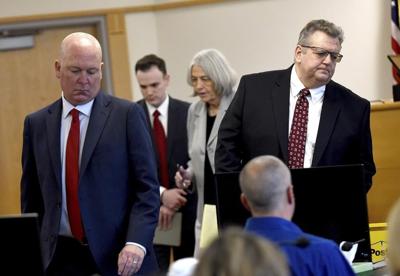CONCORD, N.H. (AP) — Attorneys for a man who prevailed in a landmark lawsuit over abuse at New Hampshire's youth detention center asked a judge Tuesday to reconvene and question jurors, some of whom have expressed dismay that the $38 million award could be slashed by nearly 99%.
A jury on Friday awarded $38 million to who alleged that the state’s negligence allowed him to be repeatedly raped, beaten and held in solitary confinement as a teenager at the Youth Development Center. But the attorney general’s office is seeking to reduce the award under a state law that allows claimants against the state to recover a maximum of $475,000 per “incident.”
Three distraught jurors have since contacted Meehan’s attorneys, including the jury foreperson, who described feeling “devastated” and “duped,” and another who said the state is misinterpreting the verdict.
No hearing has been scheduled, but here are some things to know about how the dispute unfolded.
THE TRIAL
Meehan, 42, went to police in 2017 and three years later. Since then, 11 former state workers and more than of what is now called the Sununu Youth Services Center have filed lawsuits alleging physical, sexual and emotional abuse spanning six decades. Charges against one former worker, Frank Davis, were dropped Tuesday after the 82-year-old was found incompetent to stand trial.
Meehan’s lawsuit was the first to go to trial. Over four weeks, his attorneys contended that the state encouraged a culture of abuse marked by pervasive , corruption and a
The state portrayed Meehan as a , troublemaking teenager and lying to get money. Defense attorneys also said the state was not liable for the conduct of rogue employees and that Meehan waited too long to sue.
THE VERDICT
Jurors unanimously agreed that Meehan filed his lawsuit in a timely fashion, that he was injured at the facility and that the state’s negligence caused his injuries. They awarded him $18 million in compensatory damages and an additional $20 million in enhanced damages after finding the state acted with reckless indifference or abused its power.
Jurors were unaware of the state law that caps damages at $475,000 per incident. When asked on the verdict form how many incidents they found Meehan had proven, they wrote “one.”
WHAT COUNTS AS AN INCIDENT?
That’s where it gets tricky.
In pre-verdict discussions without the jury present, lawyers for the state argued that all of Meehan’s claims arose out of a single incident of alleged negligence. Meehan’s lawyers insisted that each act of physical or sexual abuse be counted as a separate incident, even those that happened simultaneously.
“Merely raping a kid is bad enough, but it’s even worse, and a separate incident, if it also involves hitting him in the head or kicking him in the ribs or other things to get him to comply,” Meehan's attorney David Vicinanzo said.
At one point, the judge considered including a list of the type of abuse alleged on each date on the verdict form and asking jurors to determine whether an injury occurred and whether the state was liable. But the state argued that providing such a list would be prejudicial to Meehan’s side.
Judge Andrew Schulman said he disagreed with both parties and if forced to define “incident,” he would consider all the acts that happened in a given “episode” to be one incident. That put him closer to the plaintiff’s view, but in the end, he said he would leave it up to the state Supreme Court to settle.
“Why go out and define something that there’s a 50% chance of being wrong if it doesn’t need to be defined in the first place?” he said. “They can deal with it, but I don't think I have to.”
Attorney Martha Gaythwaite, representing the state, did not address the issue in her closing statement to jurors. Vicinanzo told the jury that Meehan was raped an estimated 200 times, beaten 200 times and held in unjustified solitary confinement for roughly 100 days.
“I want to emphasize to you that the numbers are very important,” he said.
In his verbal instructions to the jury, Schulman said that rather than asking jurors to list “incident by incident” decisions, he asked for “just the number of incidents for which you find liability based on timely claims.” The verdict form itself defined incident as a “(a) single episode during which the plaintiff was injured; (b) for which injuries the jury has found DHHS liable in response to previous questions; (c) on claims the jury found to be timely claims in response to question 1.”
In response to that question, the jury wrote “one.”
BUT WHAT DID THEY MEAN?
One juror explained it like this:
“I can not state strongly enough that we the jury were in unanimous agreement that David suffers from ‘one’ incident/case of complex PTSD, as the result of 100+ episodes of abuse (physical, sexual, and emotional) that he sustained at the hands of the State's neglect and abuse of their own power,” the juror wrote to Meehan's attorneys on Sunday. “We wrote one incident, because the PTSD will last with David forever and could never be clearly defined by a date or a single episode.”
In an earlier message, the juror said the question's wording was “wrong” and criticized the state for its interpretation of the answer. In separate emails to the attorneys, the jury foreperson described a sleepless night of crying after learning about the cap.
“We had no idea,” the jury foreperson wrote. “Had we known that the settlement amount was to be on a per incident basis, I assure you, our outcome would have reflected it."
WHAT HAPPENS NEXT?
The state has not yet responded to the motion to reconvene the jury. But earlier Tuesday, it filed an objection to Meehan's initial request for a hearing, saying there was no legal basis for relief with respect to the jury's “unambiguous” finding of one incident. As for not being told of the cap, Assistant Attorney General Brandon Chase noted that the judge expressly ruled that the jury would not be informed of it, in keeping with judicial precedents. In criminal trials, for example, juries generally are not told of the penalties a defendant will face if convicted to avoid affecting the outcome, he noted.
Meehan's attorneys, however, insist the judge is obligated to poll the jury when it appears a jury has misconceived its duty.
“This is not a case in which the moving party is speculating about jury error in some way grasping at straws,” the wrote. "It is a case in which three of twelve jurors have taken their duty seriously enough to come forward and attempt to correct what they perceive to be a miscarriage of justice.








































